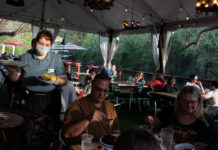Before I proceed, a disclosure is in order: I’m not neutral when it comes to coffee. In fact, I’m writing this article from my second coffee shop location of the day. That said, I’m quite certain this decision will backfire more loudly than an antique espresso machine with two broken pumps.
“How did this even happen?” you’re probably asking yourself.
I’m sorry, it’s apparently true.
And a Los Angeles superior court judge has decided this is serious enough to warrant a warning label.
Here are just a few problems with this decision, my comrades-in-cold-brewing.
First, the benefits that coffee provides far outweigh any small chance that you’ll develop a disease from a trace chemical in your favorite coffee drink. For one thing, according, again, to the National Cancer Institute, while “in the body, acrylamide is converted to a compound called glycidamide, which causes mutations in and damage to DNA … a large number of epidemiologic studies (both case-control and cohort studies) in humans have found no consistent evidence that dietary acrylamide exposure is associated with the risk of any type of cancer.”
Wait: Coffee is capable of both preventing cancer and causing cancer? Apparently so. And that’s why the California judge was far too hasty in making the preliminary decision to slap a Prop 65 label on the fuel that keeps America functioning.
We need to be restoring the public’s trust, building confidence, taking measured steps to real science-based threats, not causing hysteria over an extreme unlikelihood.
Under these conditions, slapping a warning label on coffee will effectively be a license to partake of any kind of food or beverage — or any type of activity — that the “experts” say we should avoid.
Why? Because “the experts also tell us not to drink coffee.” Ridiculous, right?
Oh, and here are some other major sources of acrylamide, according to the cancer institute: French fries, potato chips, crackers, bread, cookies, and breakfast cereals.
That study, by the way, was conducted in part by the Keck School of Medicine. At the University of Southern California.
Source : Nbcnewyork














